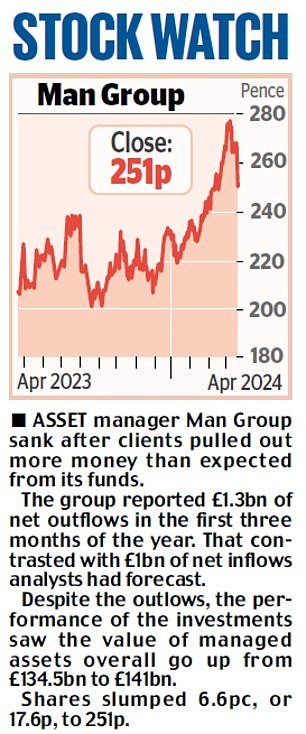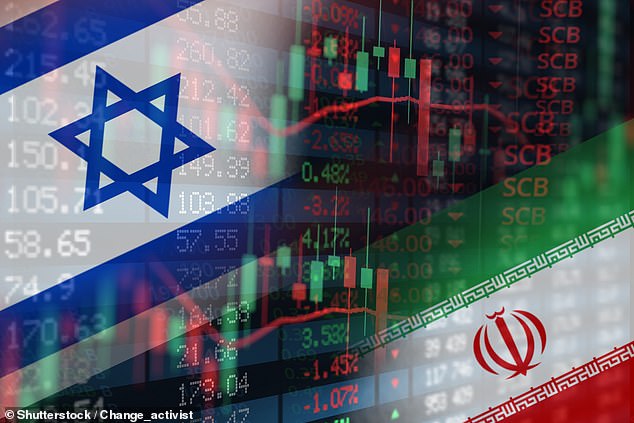The FTSE 100 has recorded its worst week since January amid renewed market jitters over the conflict in the Middle East.
Rising geopolitical tensions and fading hopes for the first interest rate cuts have been weighing on London’s main markets.
The FTSE suffered an initial sell-off fueled by concerns over Israel’s overnight strike on Iran in response to Tehran’s drone and missile attacks last week.
By the end of the session it had erased most of those losses – and ended up 0.2 per cent, or 18.8 points, at 7,895.85 – but was still down 1.25 pence over the course of the session. a week in which geopolitical tensions have accumulated.
London’s main stock index had last suffered a worse week when it fell 2.14 percent in the week ending January 19.
Growing tension: The FTSE suffered an initial sell-off fueled by concerns over Israel’s overnight strike on Iran in response to Tehran’s drone and missile attacks last week.
Mid-cap investors also suffered losses, as the FTSE 250 fell 0.3 per cent, or 59.37 points, to 19,391.3. Commodity prices rose in early trading, with gold rising above $2,400 an ounce, near record highs.
Oil prices also rose, with Brent crude surpassing $90 early in the session.
But both gold and oil pared their gains later in the day when Iran said the attacks had little impact.
Gold producers fell, with Centamin falling 0.5 per cent, or 0.6 pence, to 127.5 pence and Fresnillo falling 1.3 per cent, or 8 pence, to 602 pence, but oil major BP added 0.5 per cent, or 2.5p, to 514.9p and rival Shell gained 0.3p. per cent, or 9.5p, to 2,851p. Randeep Somel, fund manager at M&G Investment Management, told the BBC’s Today programme: “It’s good to see that this hasn’t gotten any worse and that the disruption to markets will hopefully be short-lived.”

The price of bitcoin, the world’s largest cryptocurrency, rose almost 2 per cent to around $65,000 (£52,000) ahead of the digital currency’s so-called “halving” taking place over the weekend. .
This is when the reward for mining bitcoins is halved and tends to occur every four years.
On Wall Street, Netflix shares fell even as the world’s largest streaming service reported that 9.33 million paying customers joined its platform between January and March, bringing the total to nearly 270 million worldwide. the world.
Shares fell nearly 9 percent.
In London, weak retail sales dragged down the industry. Discount retailer B&M fell 1.9 per cent, or 9.6p, to 510.4p, JD Sports, the self-styled ‘King of Sneakers’, fell 2.8 per cent, or 3.35p pence, to 116.95p and High Street stalwart Marks & Spencer fell 1.8 per cent, or 4.4p, to 2,458p.
Separately, broker Peel Hunt said three of Britain’s major banks are undervalued and should recover once the economy improves. Barclays, NatWest and Lloyds are expected to deliver almost £30bn in capital returns over the next three years.
Peel Hunt told clients to buy shares in Barclays and NatWest. Barclays rose 1 per cent, or 1.86 pence, to 185.84 pence, NatWest gained 0.5 per cent, or 1.3 pence, to 276.7 pence, but Lloyds lost 0.2 per cent, or 0.08p, to 50.92p.
Darktrace was on the rise after Bank of America analysts upgraded their rating on the cybersecurity company’s shares, which rose 3.9 per cent, or 17.8 pence, to 476.2 pence.


